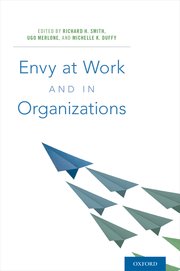Envy at Work and in Organizations (January, 2017)
Richard H. Smith, Ugo Merlone, Michelle Duffy (Eds.)

Competition for resources, recognition, and outcomes is a fact of life in organizational life. When one falls short in comparison to colleagues or subordinates, feelings of envy may arise. Envy is ubiquitous and painful fueled by inferiority, hostility, and resentment. At the same time envy is also a socially adaptive emotion signaling competitive disadvantages that must be dealt with. How people cope with envy at work continues to be a debated topic. Will they “level up” with their envied counterpart through self-improvement behaviors? Or will they “level down” through sabotage and undermining their peers and subordinates? The contributors to this volume, culled from many countries and an extraordinary range of disciplines, provide key insights into these and other question about workplace envy. Perspectives range from experimental social psychologists offering insights from lab studies to psychoanalytical oriented scholars with their emphasis on unconscious processes. Organizational psychologists also weigh in and describe ground-breaking findings from disparate work settings. Cross-cultural psychologists reveal the wide variety of ways that envy can emerge as a function of culture, ranging from the Japanese school system, to complex social systems of Java, and the fascinating structure of the Israeli kibbutzim. Also included are contemporary work by behavioral economists and organizational consultants, as well as an eclectic group of chapters focused on romantic relationships, leadership, and justice. This volume should also help scholars and practitioners understand the factors that help individuals and organizations overcome envy, indeed transform envy into something positive, thereby promoting workplace well-being. [from publisher web site]
New York, NY: Oxford University Press. 522 pages.
ISBN: 9.78019E+12
Call number: BF575.E65 E577 2017